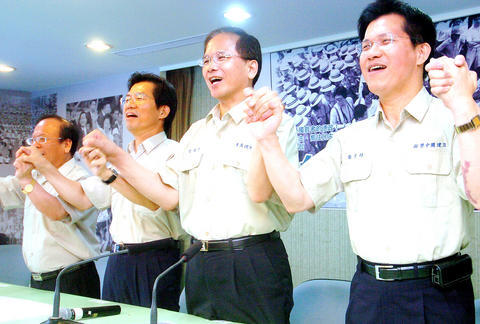Democratic Progressive Party (DPP) Chairman Yu Shyi-kun yesterday urged Chinese Nationalist Party (KMT) presidential candidate Ma Ying-jeou (
"He should give up pursuing unification with China ... He should give up the so-called `one China' framework. He should model his party on the Taiwan People's Party founded by Chiang Wei-shui (蔣渭水) and change the KMT to the `Taiwanese Nationalist Party' to show he truly identifies with Taiwan," Yu told a press conference.
Commenting on Ma's plan to make "long-stay" visits to central and southern Taiwan, Yu said it showed that Ma was not familiar with Taiwan because "long stay" usually meant "staying in a strange place in other countries."

PHOTO: CHANG CHIA-MING, TAIPEI TIMES
"Judging from this, Ma does not regard Taiwan as his homeland. His [national] identity remains problematic," Yu said.
Yu appeared at the press conference along with four senior DPP officials wearing high school uniforms dating from the martial law period as part of the party's remembrance of the 20th anniversary of the end of martial law.
The DPP officials said wearing the school uniforms highlighted the absurdity of martial law rule.
Yu said the lifting of martial law in 1987 was not a benevolent move by former president Chiang Ching-kuo (蔣經國).
"Taiwanese democracy comes from the public's sacrifice and effort rather than from the former dictator's relaxation of his policies," Yu said.
"Chiang Ching-kuo announced the lifting of martial law because he faced pressure from the public," DPP Secretary-General Lin Chia-lung (林佳龍) said.
He said this was why the party had labeled its activities to mark the end of martial law as "Pay Respect to the Taiwanese People."
Although it has been 20 years since martial law ended, Taiwan's democratization was not complete and it must continue to push for transitional justice, Yu said.
Martial law was imposed on May 19, 1949 and lifted on July 15, 1987.
The DPP said it would invite President Chen Shui-bian (
Meanwhile, senior Chinese Nationalist Party (KMT) members defended Chiang Ching-kuo (蔣經國) yesterday for his contributions and condemned the DPP for "manipulating the ethnicity issue."
"Mr. Chiang did so many things for Taiwan. He promoted many native Taiwanese and placed great importance in public opinion," former Examination Yuan president Hsu Shui-teh (許水德) said during a forum at KMT headquarters to commemorate the anniversary.
"He [Chiang] made more contributions than those who have done nothing but talk about localization," Hsu said.
New Party Chairman Yok Mu-ming (
"Chiang led the country to open up more opportunities, but the DPP government has closed the doors and made the public suffer," Yok said.
Hsu said Chiang had considered lifting martial law in 1978 when he became president, and had formed a special committee to discuss the issue in 1986.
A KMT photo exhibition documenting the period when Chiang ended martial law is on view in Tainan through Sunday. The show moves to Taichung next week and then to Taoyuan County.
Also see story:
Editorial: Identification with Taiwan is key

Taiwanese can file complaints with the Tourism Administration to report travel agencies if their activities caused termination of a person’s citizenship, Mainland Affairs Council Minister Chiu Chui-cheng (邱垂正) said yesterday, after a podcaster highlighted a case in which a person’s citizenship was canceled for receiving a single-use Chinese passport to enter Russia. The council is aware of incidents in which people who signed up through Chinese travel agencies for tours of Russia were told they could obtain Russian visas and fast-track border clearance, Chiu told reporters on the sidelines of an event in Taipei. However, the travel agencies actually applied

Japanese footwear brand Onitsuka Tiger today issued a public apology and said it has suspended an employee amid allegations that the staff member discriminated against a Vietnamese customer at its Taipei 101 store. Posting on the social media platform Threads yesterday, a user said that an employee at the store said that “those shoes are very expensive” when her friend, who is a migrant worker from Vietnam, asked for assistance. The employee then ignored her until she asked again, to which she replied: "We don't have a size 37." The post had amassed nearly 26,000 likes and 916 comments as of this

New measures aimed at making Taiwan more attractive to foreign professionals came into effect this month, the National Development Council said yesterday. Among the changes, international students at Taiwanese universities would be able to work in Taiwan without a work permit in the two years after they graduate, explainer materials provided by the council said. In addition, foreign nationals who graduated from one of the world’s top 200 universities within the past five years can also apply for a two-year open work permit. Previously, those graduates would have needed to apply for a work permit using point-based criteria or have a Taiwanese company

The Shilin District Prosecutors’ Office yesterday indicted two Taiwanese and issued a wanted notice for Pete Liu (劉作虎), founder of Shenzhen-based smartphone manufacturer OnePlus Technology Co (萬普拉斯科技), for allegedly contravening the Act Governing Relations Between the People of the Taiwan Area and the Mainland Area (臺灣地區與大陸地區人民關係條例) by poaching 70 engineers in Taiwan. Liu allegedly traveled to Taiwan at the end of 2014 and met with a Taiwanese man surnamed Lin (林) to discuss establishing a mobile software research and development (R&D) team in Taiwan, prosecutors said. Without approval from the government, Lin, following Liu’s instructions, recruited more than 70 software